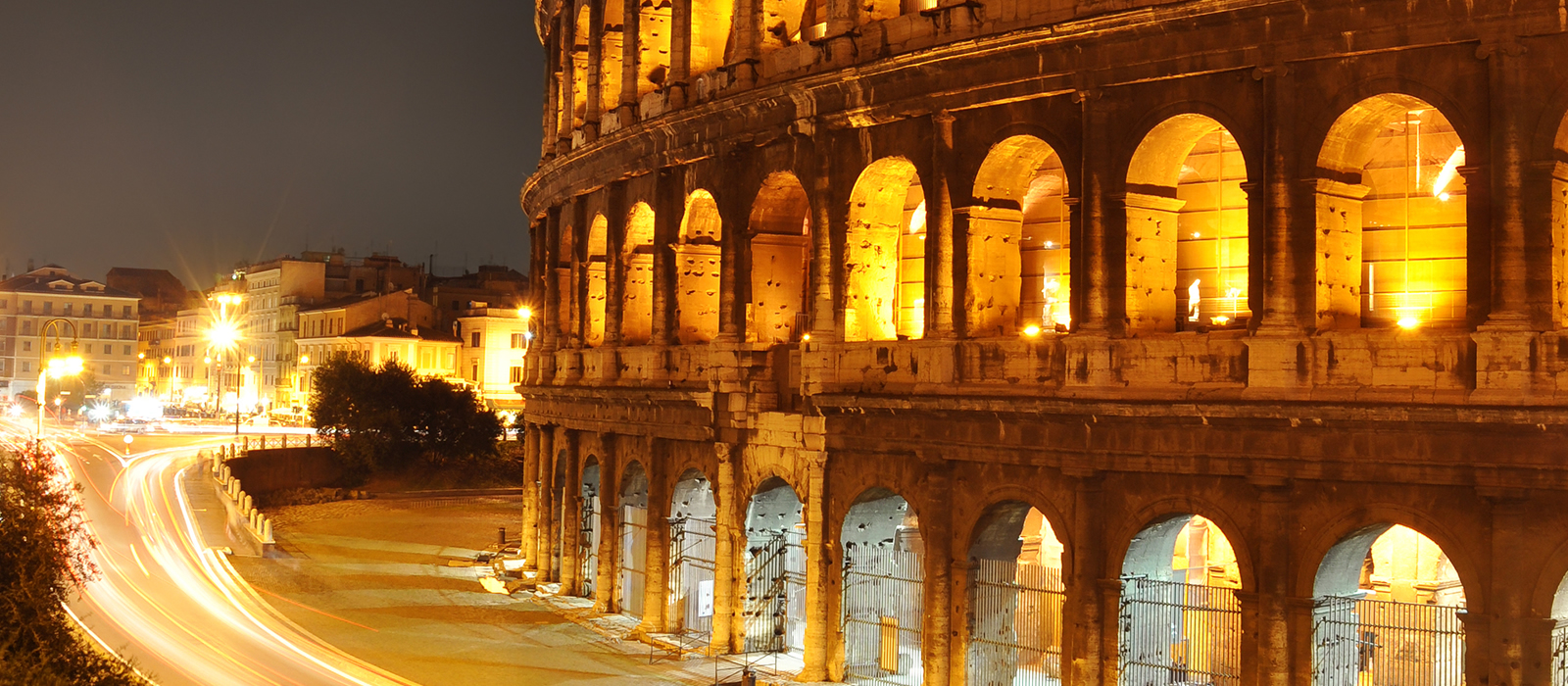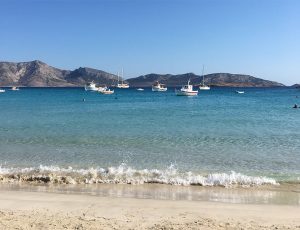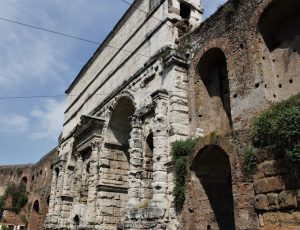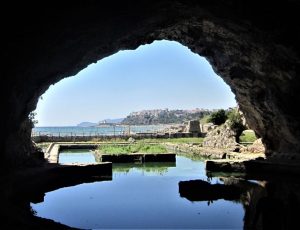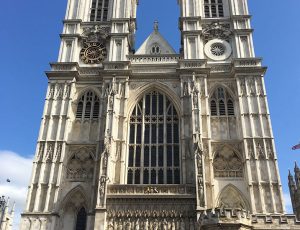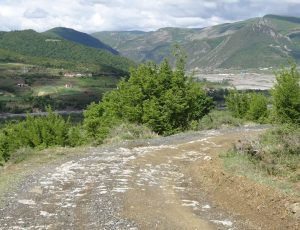Table of Contents
- In Memoriam
- Feature Stories: Carleton Students Abroad
- Beer’s Blog
- Joy’s Bookcase and Book Reviews
- News
- A Final Word of Thanks
Welcome
Dear Friends of Greek and Roman Studies,
I would like to begin this 2018 edition of the Newsletter in memory of a former student. Josh writes eloquently about Mimi Rush, whom some of you may remember from a few years ago, along with her classmates Rose Marie Amott and Margaret Campbell.
In Memoriam
Mimi Rush: Requiescas in Pace, by Josh Beer
It was with sadness and a deep appreciation of her life and achievement that I read the obituary of “Mimi” Rush in the Ottawa Citizen on February 23. Mimi was 84. In 1999 she graduated from Carleton with Highest Honours in Greek and Latin. Mimi was born in Indonesia to Dutch school teachers, but she was of a generation whose lives were violently disrupted by World War II. When the Japanese invaded and occupied Indonesia, Mimi became a refugee and was evacuated to Australia. It was only after the war that her family was reunited with their father in the Netherlands. In those days Latin and to a lesser extent Greek still formed a central part of the European high school curriculum. In high school Mimi had her first taste of the classical languages. University places however were very few and far between at the time, especially for women, so there was no possibility of her going on to post-secondary education. Later she met Stephen Rush, an expatriate Ukrainian, and she emigrated to Canada in 1955 to marry him. With so many disruptions in her early life it was only in a Canada she loved greatly that Mimi finally found a stable life. She trained as a nurse and then raised three girls before taking work in a supermarket.
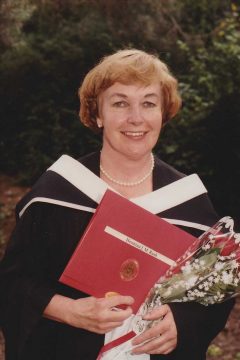
Hermina (Mimi) Rush Née Huis In’t Veld, May 18, 1933 – February 7, 2018
It must have been in the early to mid 1990s that Mimi first started to take Latin and Greek courses at Carleton. She did not need foundation courses in the languages even though it was the better part of 35-40 years since she had last taken them. Her philological expertise was still very much in evidence. I best remember her when she and two other mature women were in a 4thyear Greek class with me. Professor Michael Welsh had endearingly called them the three Graces (Greek Charites) – something that no doubt would be considered politically incorrect these days. The three Graces in myth were beautiful women who accompanied the Muses.
Like Mimi, Rose Marie Amott was very accomplished in the classical languages and, although they were friends, I sensed there was a slight rivalry between them, but I’m damned if I could have separated the two of them academically. It was only a week ago I was trying to track down Rose Marie to put her on the FGRS newsletter mailing list. I think I’m halfway there. After her husband died, Rosemary moved out to BC.
Margaret Campbell was no less interesting – I taught 3 generations of her family, beginning with her son and ending a few years ago with her grandson who I don’t think was very impressed with me. Margaret had graduated as a medical doctor some years after WW II at the University of Edinburgh but had never practised medicine when she emigrated to Canada. She had taken several CLCV courses and decided in her ‘60s that she had to learn Greek. I think it was her road to Damascus moment. She was married to a Psychology Prof. whom I knew quite well. One day he came into the Faculty Club and said: “God damn you, Josh Beer. You’re ruining my life” or words to that effect! “I can’t go into the bathroom, the kitchen or up the stairs without seeing Greek verbs scribbled over all the walls.” If Margaret is still alive, she is in a nursing home near Toronto.
What a pleasure and a privilege to teach three such committed students and wonderful people. I remember that one term I was teaching them Homer and, after we had read a couple of books, there was still 3 or 4 weeks of term left, and they asked if perhaps we could read some Hesiod. I decided instead that we would read the Homeric Hymn to Demeter. They were delighted since they were all avid Greek myth fans.
In one class Mimi rushed in at the last moment and apologized. She had been working at Loblaws, the first I had heard of this. So I asked her at which Loblaws. “The big new one in the west end,” she said. I at once asked, “Do they sell John West’s Kipper Fillets by any chance? They seemed to have disappeared from the downtown stores.” “Yes, I think so,” she replied. “Can you get me some, if I pay you?” “How many would you like?” “As many as you can get.” The following week she delivered 12 cans. I was over the moon with happiness. Thank you so much, Mimi. You were always a joy to teach, and I hope that what I have written is a small token of my respect. Requiescas in pace.
Feature Stories: Carleton Students Abroad
In putting together material for this 2018 edition of the Newsletter, I seem to have been carried away by thoughts of traveling to those “antique” lands of Greece and Italy. I have not been anywhere near them myself in quite a few years but I delight in knowing that our students are eager to see first hand the places that they read about in their courses, and some of them each year are lucky enough to make a journey well beyond their classrooms and the library. We might ask, “Why?” Why do they travel to these places, what draws them?
Perhaps they agree with Samuel Johnson, the 18thcentury English literary figure, who wrote about the Mare Nostrum: “The Grand object of traveling is to see the shores of the Mediterranean…All our religion, almost all our law, almost all our arts, almost all that sets us above savages, has come to us from the shores of the Mediterranean.” Or perhaps the reason is more simple; perhaps the students travel “out of mere curiosity, to see what they could see”, to quote Herodotus (3.139) about why the Greeks traveled to Egypt. In the following contributions by Carleton students you will find some of the personal reasons for their travels.
Beer’s Blog
2017 was the first time in 50 years I did not give a lecture to students. Whether this is a sign that the Grim Reaper is beginning to dog my footsteps I cannot say. Not that the year was without activity. I had a letter published in the London Review of Books on a 1000 year use of the Greek word for “barley corn” (it is a euphemism for penis) in the ancient theatre and another in The Guardian Weekly on the egregious errors of a reviewer of Colm Toibin’s recent novel, House of Names, based on Aeschylus’ Oresteia. I also led a study group of high powered people on Greek tragedy. The formation of this group was proposed to me by a fascinating psychoanalyst who felt that her own education was deficient in this vital area. Who am I to disagree? As a result I am now working on a new interpretation of Euripides’ Hippolytus, a brilliant tragedy about one of my two favorite deities: Aphrodite, the other being Dionysus. For good or ill, age has forced me to cultivate these two gods less than when I was younger. In Plato’s Republic (329 b-c-28) there is told the story of the aged Sophocles — he was 90 when he died — who, when asked whether he was still devoted to the affairs of Aphrodite and capable of having sex with a woman, replied: “Let’s talk about something else; I’m so happy to have escaped from her as if I have escaped from a crazy and savage despot”. I have not yet reached the point of Sophocles’ sexless bliss, but in this matter I live nowadays more in fantasy than hard reality. Things are looking up however in 2018, for I was asked to give a seminar, in early January, on “Truth in ancient Greece and Rome” for a 4thyear course in Sociology, entitled “Truth and the Media”. It gave me fresh ideas, especially as the Greek word for truth, aletheia, means “not forgetting” and is etymologically related to the English word “lethal” (deadly). This reminded me that my mortality has not quite caught up with me and, as I lectured, I did “not forget” some of my own youthful enthusiasms.
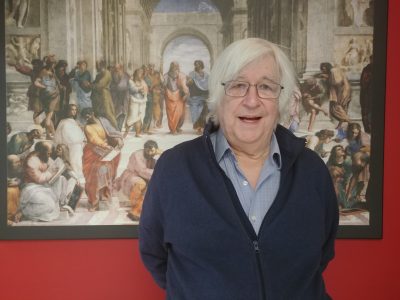
Josh Beer
2017 was an exceptional year, not least for anniversaries. There was of course the centenary of the Russian Revolution and the 5thcentenary of Martin Luther’s 95 theses which provoked the Protestant Reformation. Both of these have had profound effects on the modern world. Closer to home there was the 75thanniversary of the founding of Carleton University in 1942. I was vividly reminded of it long ago in the 1980s, while teaching beginning Greek. That year, the class was divided up into two half courses, one (A) in the Fall and one (B) in the Winter term. There was a lovely elderly lady in the course who, quite naturally, found the amount of learning a strain — the standard Greek verb, for example, has about 450 forms. The lady in question had not realized she had to re-register for the B half course in January and came to me in a panic at the beginning of February to say that she was not registered. I calmed her down and said I would contact the Registrar’s Office and fix it. I asked for her student number; she gave me a number between 41 and 49 – the precise number does not matter. At this point I almost fainted and asked when she had taken her first course at Carleton. She replied: “1942”. History is all around us even though we may not realize it.
Of course the big anniversary in 2017 for most Canadians was the sesquicentennial, the 150th anniversary of Confederation. In 2011, as a retirement project, I had founded ‘The Ottawa Society for the Arts and Sciences’ (OSFAS which can be googled). For the sesquicentennial celebrations OSFAS held a panel discussion on “Ottawa Then and Now: from 1967-2017”. I spoke on food and entertainment. I divided my words under two headings: “Behind Closed Doors” and “The Bridge to Hull”. FGRS needs money so if you would like to see my comments, you can purchase them from me for a dollar a word. If you believe this fee is too much, don’t forget the story at ancient Rome about the purchase of the Sibylline Books. If you don’t buy this time, the next time you may get less for your money. More likely however you will feel that you have saved yourself a lot of money, unless you nurture very generous feelings towards FGRS.
As a classicist, for me the most important anniversary of 2017 was the death of Ovid, 2000 years ago in 17 AD. I googled his name several times without success. What was the cause I wondered of this neglect? Was it because he was a naughty — a word to which I shall return — boy and was exiled by Augustus for his carmen (poetry) and error? We still do not know what the error was. Even today in the new puritanical climate much of Ovid’s work is regarded as politically incorrect, and we are in danger of repeating the actions of a Roman dictator by banning much of his poetry. I doubt if you will find Ovid’s Ars Amatoria on too many university curricula today. His Metamorphoses however, very naughty though it is in places, is arguably the most influential of all Roman poems — especially on Renaissance art and Shakespeare and this influence continues and has helped shape the modern western world. What other literary work has dealt with LGBTQ issues with more imagination? Such neglect worries me. It was therefore with much relief, if that is the right term, that I learned in December 2017 that the City Council of Rome had revoked the exile of Ovid. Up yours, Augustus! But where are the classicists? If we do not commemorate our own, is our discipline — I should rather say our alma mater — worthy of survival? Classicists have got to be much more vocal in the public domain. Let us all take a leaf from Mary Beard, a major exception, about whom I hope to write on a later occasion — the Grim Reaper being willing. In the meantime buy her latest offering which appeared about the same time as the revocation of Ovid’s exile: Women & Power: A Manifesto. This includes several references to Ovid.
Let me end by returning to the word “naughty”. The angel Catherine, my partner, and I went to our local Japanese restaurant in December. When we entered Cathy went to the washroom, while Serena, the waiter, led me to our table. I ordered green tea and then said; “You can also bring a large Sake which I’d better order while Cathy is not present because she thinks it makes me NAUGHTY”. Serena looked at me and said “NO TEA?” The joys of the spoken word.
Back to Top↑
Joy’s Book Case
This is an annual feature of the Newsletter, which includes at least one book review and additions to the list of books begun last year, books about Classical Antiquity or somehow related to it, though not textbooks as such. The list is eclectic and I hope that readers will contribute to the list and/or write reviews of books that might be of interest. (This feature is named for my friend, Joy Barrie, who was a student in the Classics Dept. some time ago and continues to give me books to read.)
First a Book Review by John Gahan
The Volcano Lover – A Romance by Susan Sontag (New York: Anchor Books, 1992)
Sir William Hamilton wore many hats during his seventy odd years. He was a soldier, a country squire (albeit over the lands in Wales that his first wife inherited), a Member of Parliament, a diplomat. In that capacity he was the British Ambassador to the Bourbon Court of Naples from 1764 to 1800. We classicists know him primarily as an antiquarian because of the vast collection of ancient Greek vases that he amassed while in Italy. He also developed a reputation as a volcanologist for his in-depth study of Mount Vesuvius. Susan Sontag alludes to this in the title of her 1992 novel about Hamilton, The Volcano Lover, to which she appends “A Romance.” In the literary sense a good romance has its hero though Sontag’s is not Hamilton but Admiral Horatio Lord Nelson instead, the lover not of volcanoes but of Emma Hart1, Hamilton’s second wife, in one of history’s more famous ménages-à-trois. Is Sontag, by the way, also playing here with the other sense of romance as a love affair and underscoring it by the word Lover in her title proper?2
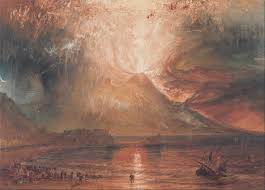
Vesuvius in Eruption by J.M.W. Turner
The Volcano Lover is, then, a historical novel set against the backdrop of late eighteenth century Naples and its ruling class, but in her interpretation of all this Sontag as novelist — she was also an essayist and political critic — has her focus initially on Hamilton naturally enough but then on Emma and finally Nelson, who becomes the third member of the eventual trio as a consequence of the French Revolution. Hamilton’s pedigree was without question, though he still had to work for a living. Emma on the other hand, despite her low birth and poverty, became after her marriage to Hamilton famous in the society of her day. Nelson? He had a grammar school education but embarked upon his naval career in his early teens only to become the greatest war hero of the day before he died in 1805. Stellar though the dramatis personae are, Sontag’s novel is perhaps more appealing still to the student of Greece and Rome for its setting in the heart of ancient Magna Graecia and because of Hamilton’s antiquarian interests and also his “love” of volcanoes that takes him more than once up the slopes of Vesuvius and farther south to Mount Aetna in Sicily.
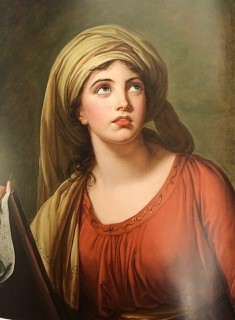
Life Study of Lady Hamilton Emma Hamilton as the Cumaean Sibyl by Elisabeth Louise Vigée Le Brun
Classicists, then, but for that matter anyone interested in eighteenth century European social history will find The Volcano Lover a good read and its main characters and setting intriguing, but to conclude I want to call your attention to the novel’s Ottawa connection — tenuous admittedly, but, yes, there is a connection. In its summer 2016 exhibition the National Gallery of Canada featured Elisabeth Louise Vigée Le Brun (1755-1842), the most prominent female painter of her day, according to the Gallery, and portraitist to Marie Antoinette. Among Vigée Le Brun’s works was a painting of Lady Hamilton, which depicted Emma as the Cumaean Sibyl (1792). Fanciful as this rendering may be, it is historically accurate. While in Naples Emma often entertained her and Sir William’s guests with what she called her “attitudes” (tableaux vivants) for which, suitably costumed, she would strike poses to evoke images from classical myth.3 These “attitudes” doubtless formed the basis for this painting of Emma by Vigée Le Brun, done no doubt in connection with a visit she paid them in Naples. The visit is catalogued in The Volcano Lover.4
1 She changed her childhood name of Amy Lyon to Emma Hart.
2 For that matter is the author possibly alluding to Nelson in the title itself, not as a volcano (but a volcanic) lover? Though Nelson was roughly half Hamilton’s age and only in his mid-thirties when he and Emma met (she was twenty-eight and not long married to Hamilton), war had taken its toll on him.
3 In connection with an exhibition devoted to Emma Hamilton (November 2016 – April 2017), the Royal Museums Greenwich included among the essays about her “Emma Hamilton: The Lady with Attitudes” (http://www.rmg.co.uk/discover/explore/emma-hamilton-attitudes).
4 P. 164 f., cf. p. 173.
Some new books for the Book Case:
- An Odyssey. A Father, A Son, and An Epic by Daniel Mendelsohn (2017)
- Lost and Found: The 9,000 Treasures of Troy. Heinrich Schliemann and the Gold That Got Away by Caroline Moorehead (Penguin 1994)
- Pagan Holiday. On the Trail of Ancient Roman Tourists by Tony Perrottet (2002)
- Women and Power: A Manifesto by Mary Beard (2017) (Mary Beard will be the focus of Beer’s Blog in the next newsletter.)
- Travels with Herodotus by Ryszard Kapuściński. Translated from the Polish by Klara Glowczewska (2007)
As a young correspondent for a Polish newspaper, the author begins his career in India and travels from place to place, all the while carrying with him a copy of Herodotus’ Histories, and this ancient writer becomes his constant companion. Kapuscinski writes (p. 270): “There were times when journeys into the past appealed to me more than my present-day journeys as correspondent and reporter.”
I invite you to review any of these books for our FGRS readers (or those listed in Joy’s Bookcase in the last newsletter) for the next edition.
Departmental News
The Venus de Milo in Paterson Hall
Regrettably, the gift of a life-sized replica of this famous Greek statue, as announced in last year’s newsletter, did not materialize for reasons unknown. Suggestions for some other suitable and iconic image of Classical Antiquity for Paterson Hall are welcome.
October Trip to Greece Shane Hawkins
Curious about the birthplace of democracy, theatre, western literature and philosophy? With its timeless art and architecture, Greece is still the center of our cultural imagination. Listen to Professor Shane Hawkins as he talks about some of the marvels you can expect to see firsthand on the upcoming 11 day small group trip to Greece which he will be leading. This trip is taking place October 11-21, 2018 so learn more!
The “Greatest Hits of Greece”: CLCV 3400 in May 2019
Professor Susan Downie will be leading a study abroad trip (CLCV 3400) to Greece in the early summer term of 2019. This is a “repeatable” course, so if you joined Professor Klaassen in Italy last year, you can still get credit for going to Greece as well. The trip will include roughly 3 weeks of travel starting with several days in Athens where (among other things) we will visit the Acropolis, agora, Kerameikos (all of which have their own museums), and the National Archaeological Museum. Then we will travel by bus to some of the most famous places in central Greece and the Peloponnese, starting with Thebes and Delphi, then moving on to Olympia, Pylos, Sparta, Mycenae and Tiryns, Epidauros, Corinth / Acrocorinth and Eleusis. Be forewarned that there is a lot of strenuous walking on this trip! There may be additional sites in our final itinerary, and when we stay in Nauplio, those of you who have been to Italy can judge whether Greece or Italy has the best gelato on the planet.
Throughout the trip we have various professionals speak to the students about their work. In the past, this has included museum curators at the NAM, site conservators, specialists on pottery and human osteology, and excavation directors. This is a course for credit, so there are academic requirements: during the trip you must attend all mandatory site and museum tours and you must keep a daily journal about what you have seen and heard. Once back in Canada, you must complete a take-home exam and brief research essay. Auditors are welcome but can only be included in addition to registered students. If you audit the course, you must still attend all mandatory site and museum tours and you must contribute to the academic content of the trip, normally by giving a brief presentation on an academic topic at the location of your choice. The final cost will not be available until the fall, but should be roughly $4000 – including all travel to, from and within Greece, all accommodations, and breakfasts. There will be an information session in the fall term and a deposit is normally due by December, but please contact Professor Downie (susan.downie@carleton.ca) if you want more information.
CORVUS
The Carleton Classics Society has just published the latest volume of the journal Corvus and it is available both online (online link here)and in print. It can be purchased for $10 for non-members and $5 for members; please contact Shamus.Mccoy@cmail.carleton.ca. Check out the 2018 Corvus PDF.
Donations
Donations to the Friends of Greek and Roman Studies are gratefully accepted and receipts will be issued. Donations are used for departmental events and honoraria. Thank you for your past contributions.
Acknowledgements/A Final Word of Thanks
I would like to acknowledge the help of Josh, Walter, Shamus, Ally, Samantha, Sheri, and John who have kindly contributed to this edition of the Newsletter. I hope that you all have enjoyed the articles. But the Newsletter would not appear in this format, so nicely put together and arranged with pictures and links and special details without the computer expertise of Patricia Saravesi in the Dean’s Office and the organization and patience of Andrea McIntyre, our GRS administrator. I am once again very grateful to them both.
The Very Best,
